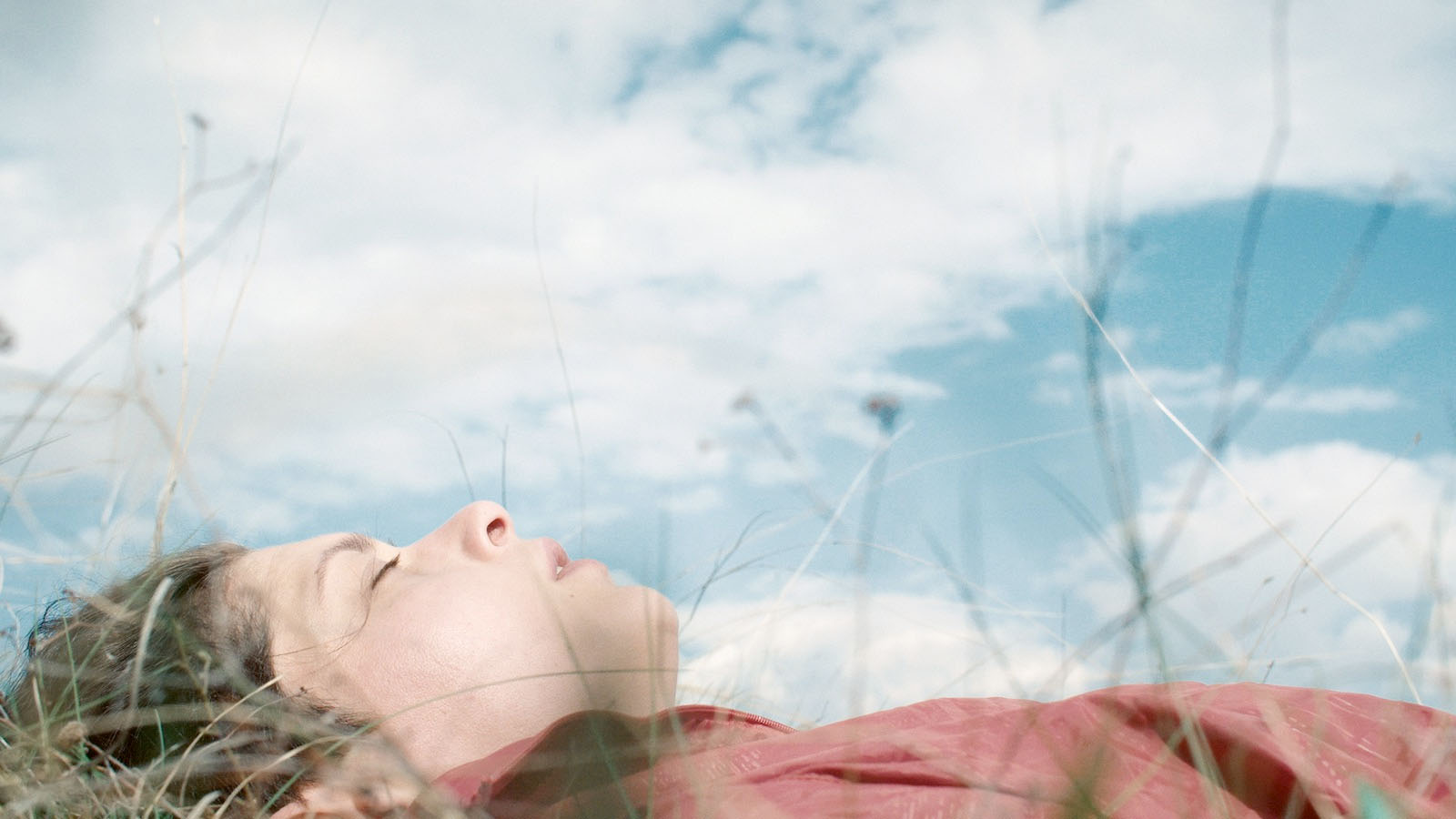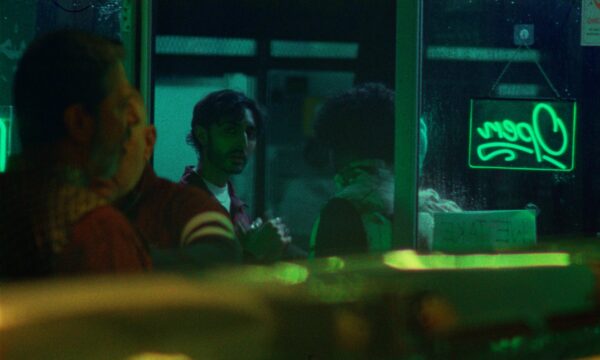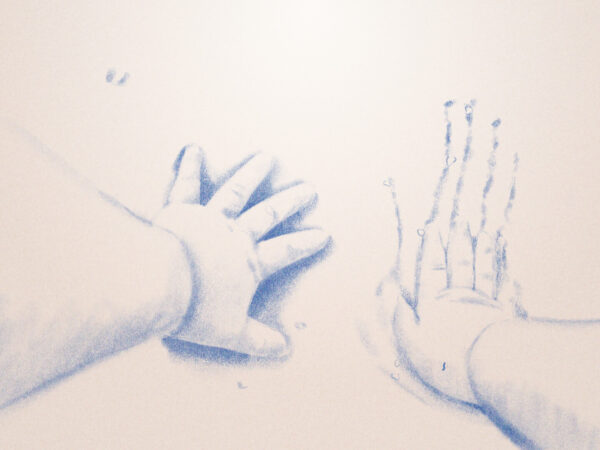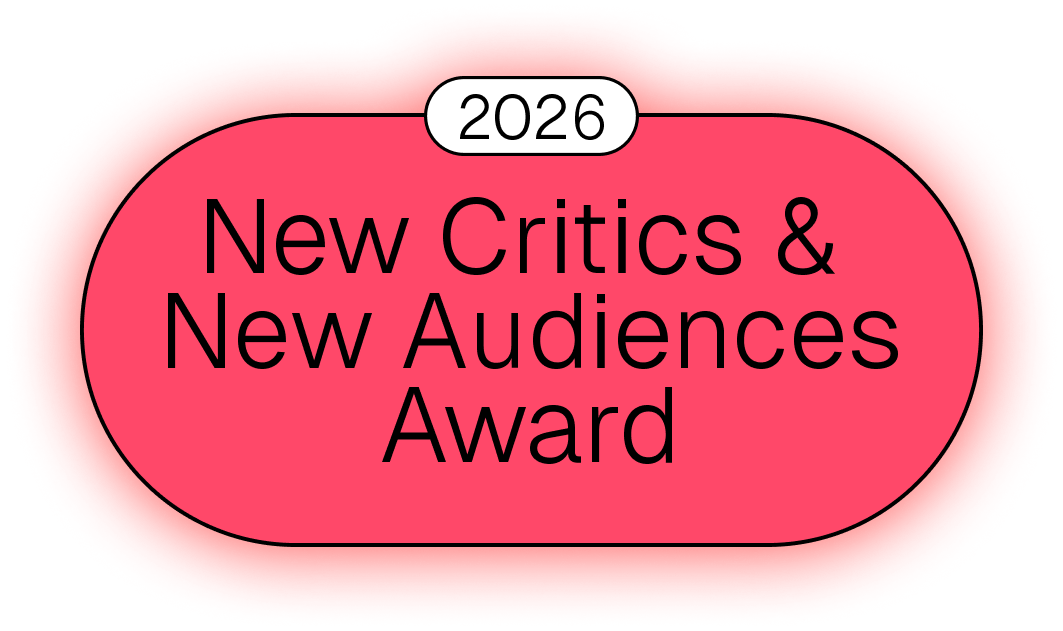Love Rhymes With Love
Eggshells
In Doytcheva’s account of Bulgarian queer life, we are constantly reminded that identification does not have to be tied in to subjective manner of narrating.

“Jeg elsker deg”, “S’agapo”, “Volim te”–the endless ways of translating “I love you” in various languages establish a dialogue pouring over the black screen even before the viewer can identify any characters in sight. A couple is making their way home—sweet-talking each other into climbing the next flight of stairs. At one point, one of the two women recites an improvised two-liner, its ring reminiscent of nursery rhymes, but its content (admiration towards a girl) and result (the women share an amorous kiss mid-stairs) encapsulate the overwhelming tenderness which permeates the compactly framed scene. With such an opening, Eggshells, makes a promise of togetherness which it will later trial and test, to give a tacit verdict on the way love reconfigures its shapes and forms when backed up in a corner.
The first marker of a test comes with a rushed phone call, and its aftermath is immediately announced: Nevena will have to spend Easter day by herself, while her girlfriend Maria visits her family, by herself. This tacitly agreed plan reads abandonment but, when taking into account the Bulgarian context (blatantly homophobic), to which the film only gestures to, such a decision can be also read as a protective one. Therefore, the fact that a lesbian relationship being conveniently (for the family, of course) hushed already establishes a melancholic tone which will imbue the film from beginning to end. However, an intricate connection between symbols, rhymes, and indirect conversations bear traces of hopefulness and optimism, traits which are found in all of Slava Doytcheva’s films.
Eggshells, like her previous film, Whole, encapsulates the systole and diastole of a young woman’s interior world when confronted with the suffocating heteronormativity in her Bulgarian family, all within the scope of a day. If, for Whole, the topos was a catalyst for the already existing tensions (a heterosexual wedding and the unbearable sense of non-belonging), Eggshells makes use of a certain time–even more, of religiously-coded time–to expose the scar-tissue of that same sense of not belonging.
It’s Holy Saturday, the last day of preparation before Easter Sunday, and in the Orthodox customs to colour and hand-paint boiled eggs. Once alone, Nevena paints two eggs bright red, as it is traditionally done (blood and suffering symbolism aside), and hops on a train which takes her to the place she grew up in. In the absence of contextual hints, no dialogue or narration to signal any particular past event, the scenes of her trip, verdant and bright, carry the weight of an exiled experience. The camera often follows Nevena in her solitude when exploring the village and its surroundings, and at times, it even assumes her point of view. One can then trace the curious lines in the sky left by passing airplanes, or lock their gaze with that of a concrete skeleton of an abandoned building site staring back. It is the alternation of third and first person perspectives which pre-empts the protagonist’s conflicted position as an outsider looking in, when she recognises a familiar face but her hesitation traps her in a desperate act of clinging to the garden gate.
Curiously, the anticipated meeting between the daughter and the estranged father (a possible reimagining of the Biblical myth?), spans out more like a game, than a familial altercation. While Nevena is helping her dad bring in all the firewood inside, a long take slowly closes in the central part of the frame, where the actual exchange happens: she hands him over the log and comes up with a nonsensical line, and he responds with one that rhymes.
Rhymes become persistent symbols, uttered once and again, to become an underlying, structuring principle of the film world. Together with the red-painted egg, these nursery rhymes articulate details about the character’s relations that often elude the actual dialogue. This back and forth goes on to become an entertaining, bonding experience, which also recontextualises the film’s opening and establishes a deeper, albeit unspoken, connection between the protagonist and her father. With the use of such verses, rhythm of Eggshells taps into the long lived tradition of oral storytelling and also brings forth the accompanying intimacy, associated with childhood memories, even if their traces have gone cold.
Eggshells is a layered meditation on returns and flights, aesthetics matching its conceptual form. Repeated shot compositions, parallel train journey sequences bookending Nevena’s meeting with her father, inner structural repetitions and the return to rhymes–all of these techniques subtly bring in the viewer to an intimate, secluded space where time is cyclical and full of promises. Doytcheva’s economic storytelling helps elucidate the depths of subjectivity without actually translating the character’s interior world into their surroundings. Instead, the minimal means of longer takes draw in more from the scene’s visuals and aural potential. In a static take, slight camera shakes attribute just the right amount of uncertainty to dispel the viewer from over-psychologization.
In Doytcheva’s account of Bulgarian queer life, we are constantly reminded that identification does not have to be tied in to subjective manner of narrating (whether it’s voiceover or point-of-view shots), and the effortlessness of a tremble and a shiver in a tightly-framed, longer episode, conjures up its own cinematic language to invite the viewer in the character’s place, and to simultaneously keep them (both character and viewer) from melding into one entity. Without a doubt, there’s also a political stake in her aesthetic precision both as a director and as an editor, which ties into an ethical position. The world may as well exist even if cinema was no more, but that doesn’t mean films bear no responsibility to the social tissue it’s made of. Just like Nevena had succeeded in building a life despite the severed family ties it cost her, but still, one often finds their hand pecking at the open wound, out of habit, out of need.
Slava Doytcheva’s last three short films were shown at more than seventy film festivals worldwide, and have gone on to win many awards—the latest of which at Palm Springs Film Festival, for Best LGBTQ+ Film. However, the Bulgarian premiere of Eggshells made the news thanks to flocks of alt-right demonstrators who wanted to sabotage the event, keeping everyone in the room on their toes. And while, after the screening, the anticipated violence didn’t actually manifest itself, relief and surprise were only a couple of the emotional states shared by this ideologically mixed crowd.
I’m sure the self-proclaimed ‘conservative’ ones in the audience had been taken aback by the way the film portrays a particular (lesbian, queer) struggle as both distinctly alienating and inclusive. Eggshells was never meant to serve as a lesson in interpersonal acceptance, and as a standalone piece, it testifies to the struggles of LGBTQ+ people, which, on the one hand, welcome the support and understanding, but on the other hand, must not be effaced in the name of a story’s abstract ‘universality’.






There are no comments yet, be the first!